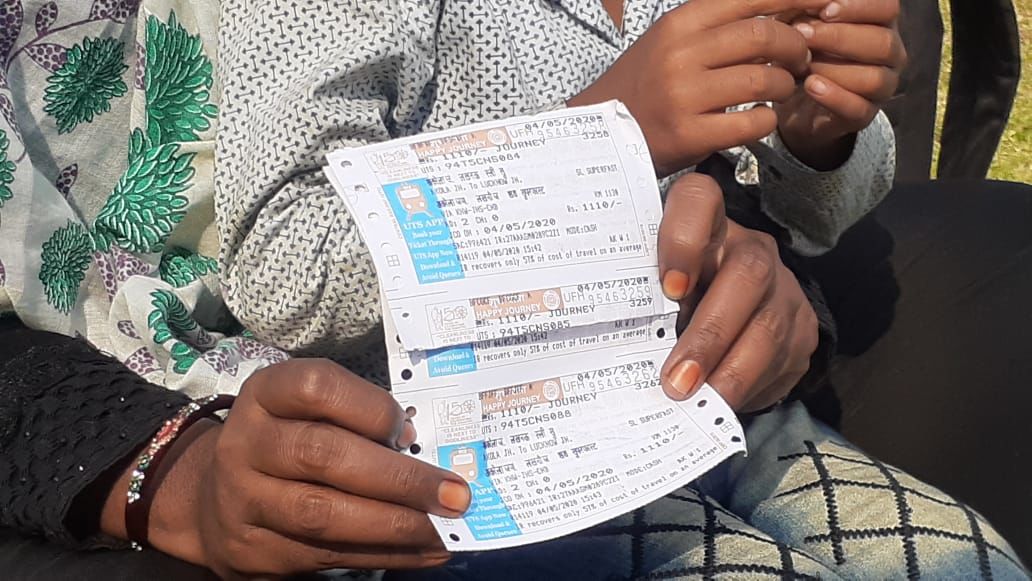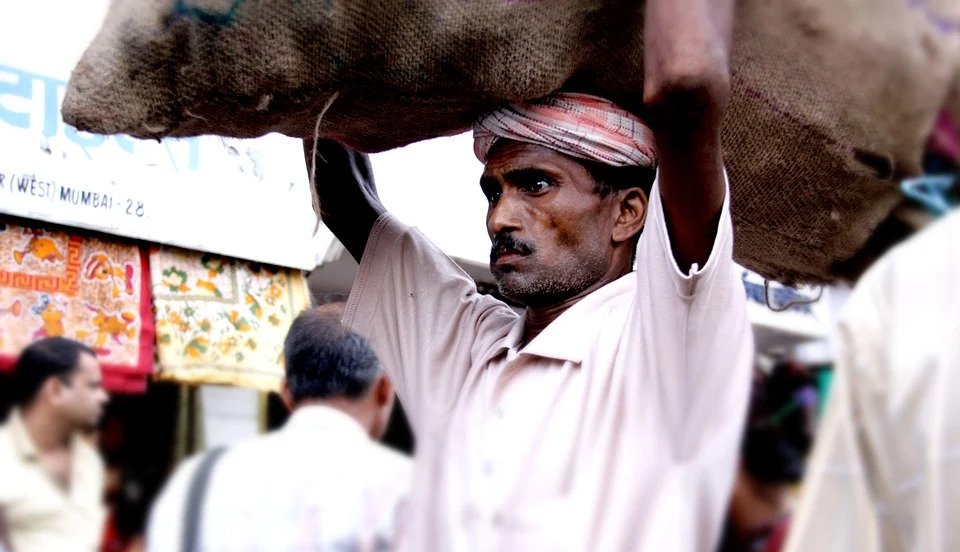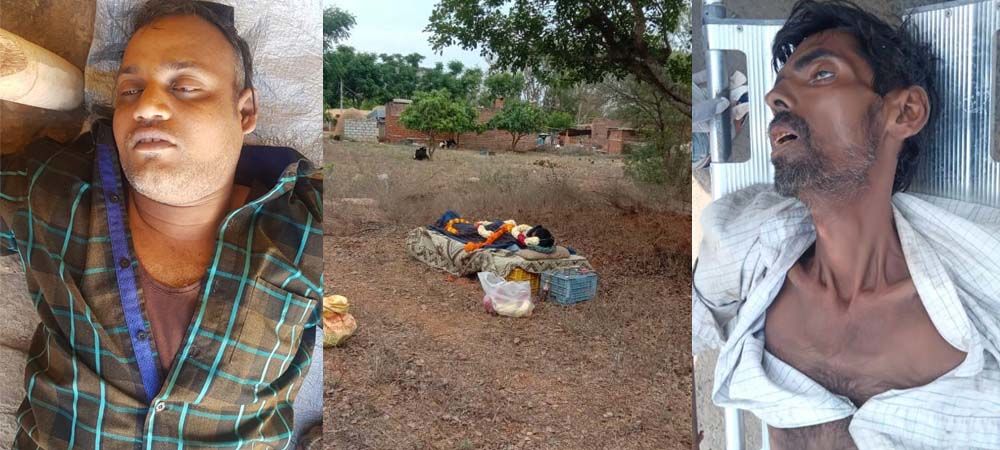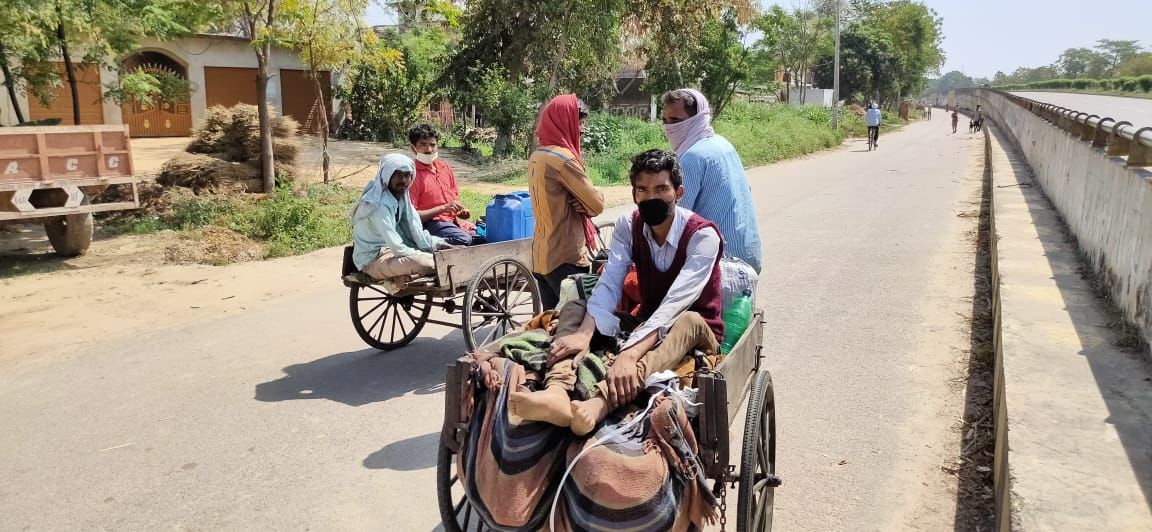Bengaluru to Prayagraj: Youngsters set out on their bicycles to reach home
Rahul and his two friends started their journey somewhere between the Karnataka government's conundrum to cancel and then letting the special train for migrants run again. They are not alone

Rahul Bind, 23, sat in his room for 42 days, is stranded during the lockdown. The money that he had received while working for the automobile factory was already spent in procuring food. So, as soon as a slight relaxation from the lockdown was announced in Karnataka, Rahul walked 30 kms to Bengaluru and bought himself a bicycle for Rs 4,800. He decided to peddle to his home in Uttar Pradesh, 1,750 kms away.
On May 7, when Rahul spoke to Gaon Connection, he had reached near Hyderabad, which is 400 kms from Bengaluru, while cycling with his three companions. While relaxing outside a petrol pump, Rahul said: “I used to work with Honda’s part-manufacturing factory and was at home for 42 days. We had no means to return home, so we bought bicycles. Our house is in Jaunpur district ahead of Prayagraj in Uttar Pradesh. It is about 1,700-1,800 kms away.”
He also has two other companions, one of whom had met him at the same bicycle shop where he went to purchase a bicycle. Rahul and his colleagues get a salary of Rs 11,500 a month. Their factory was in Kolar near Bengaluru and they had rented a room at Narsarpura. Lakhs of young and migrant labourers like Rahul have been deprived of livelihood in Karnataka alone. The number of unemployed in India has crossed millions due to the COVID-19 epidemic and the ongoing lockdown since March 25.
According to the Centre for Monitoring Indian Economy, 9.1 crore workers working in small industries have been rendered jobless in April. At the same time, 1.8 crore businessmen and 1.7 crore monthly salaried employees/workers have also been unemployed.

More than 2.5 lakh migrants in Karnataka had applied to return to their states following COVID 19 pandemic and the lockdown. Many labour-special trains were also scheduled to start from May 6, but after meeting the builders on May 5 and after the industrial and construction activities intensified in the state, the government had cancelled the trains. However, the migrants stranded in Karnataka, who were yearning for food and employment, opened a protest against the government. There was a lot of criticism of the BS Yeddyurappa government over social media. After receiving pressure from all sides, finally, the government has decided to run the train. The state government has written a letter to nine states to send back migrant labourers, students, workers and pilgrims.
Rahul had started his journey somewhere between the government’s conundrum to cancel and then letting the train run again. Three days ago, Rahul met social activist Sudha N when he had been to the market to buy bicycles. Sudha and his team ‘Hum Bharat Ke Log’ have so far provided assistance to more than 15,000 migrants in terms of ration.
Sudha N said over the phone, the labourers working in factories in Karnataka and lakhs of construction workers want to go home because the government has failed to arrange for their food and shelter. A week ago, she had sent a list of more than 150 people to the government from Shivaji Nagar area that did not have anything to eat, but the local administration arranged ration for only five people. It should not be surprising, as per her, when people like Rahul decide to travel thousands of kilometres by bicycle.
“I don’t know how many days it will take me to reach Jaunpur. So far, I might have pedaled around 400 kms, but my feet have swollen,” admitted Rahul. He added: “We are thinking that if we manage to board a train in Hyderabad, we would sell the bicycles here or else we have to somehow reach home.”

Two of Rahul’s relatives had arrived in Jaunpur from Mumbai in eight days and are currently quarantined in the village school. According to Rahul, although they had walked on foot, but since they took lift at various places, they could reach in eight days.
Soon after the lockdown, workers from big cities like Delhi, Mumbai had started migrating to their hometowns. But it came to public notice when lakhs of labourers had gathered around the Anand Bihar bus terminal in Delhi. Lakhs of labourers have already reached their homes upon foot, bicycles, rickshaws and tempo. In the meantime, many labourers had perished mid-way due to dehydration, fatigue and hunger.

Tabrak Ansari, 50, had set out for Maharajganj district of Uttar Pradesh with 11 of his friends from Bhiwadi in Maharashtra on March 25 but could not make it to his home. He died on the way to Sendhwa in Madhya Pradesh. The total distance from Bhiwindi to Maharajganj is about 1,600 kms, but Tabrak could only travel a total of 390 kms.
A private website of technical experts — thejeshgn.com — has recorded the figures of deaths during lockdown have been mobilised since the first day. According to these, a total of 338 non-COVID deaths have been caused so far in the country during the lockdown. These figures have been prepared for media reports across the country.
In the last week of March, most of the labourers who went on foot from Delhi to reach their homes were from Bihar. On the Delhi-Banaras and Delhi- Lucknow-Gorakhpur route, until April 10-12, the labourers were seen to be walking on foot, handcart and rickshaw.
Gaon Connection had travelled with these labourers from Lucknow Ayodhya, Gorakhpur to Gopalganj (border district) of Bihar. In the meantime, a number of labourers were found to have been pedalling cycles for the last 6-7 days in Bihar to their home districts, Chhapra, Puraniya, Muzaffarpur and Katihar.

On April 4, when Gaon Connection had come across Ashok Yadav travelling with a cycle handcart from Delhi to Bihar with two of his colleagues, he had already reached Ayodhya. Till then, he had travelled more than 700 kms and crossed Lucknow, Barabanki towards Bihar on NH-28. His village falls in Srinagar block of Puraniya district in Bihar, about 1,400 kms away from Delhi. Subsequently, the conversation had then revealed that they had not eaten anything since the previous night, because they had very little money left with them and since the number of workers walking home on road had thinned so had the number of people feeding them.

